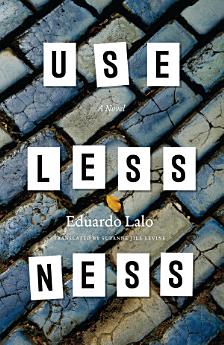Uselessness: A Novel
តុលា 2017 · University of Chicago Press
2.0star
ការវាយតម្លៃ 1report
សៀវភៅអេឡិចត្រូនិច
194
ទំព័រ
family_home
មានសិទ្ធិ
info
reportការវាយតម្លៃ និងមតិវាយតម្លៃមិនត្រូវបានផ្ទៀងផ្ទាត់ទេ ស្វែងយល់បន្ថែម
អំពីសៀវភៅអេឡិចត្រូនិកនេះ
A Puerto Rican student at a Paris university grapples with heartbreak and isolation in this compelling novel by the author of Simone.
The streets of Paris at night are pathways coursing with light and shadow, channels along which identity may be formed and lost, where the grand inflow of history, art, language, and thought—and of love—can both inspire and enfeeble. For the narrator of Eduardo Lalo’s Uselessness, it is a world long desired. But as this young aspiring writer discovers upon leaving his home in San Juan to study—to live and be reborn—in the city of his dreams, Paris’s twinned influences can rip you apart.
Lalo’s first novel, Uselessness is something of a bildungsroman of his own student days in Paris. But more than this, it is a literary précis of his oeuvre—of themes that obsess him still. Told in two parts, Uselessness first follows our narrator through his romantic and intellectual awakenings in Paris, where he elevates his adopted home over the moribund one he has left behind. But as he falls in and out of love he comes to realize that as a Puerto Rican, he will always be apart. Ending the greatest romance of his life—that with the city of Paris itself—he returns to San Juan. And in this new era of his life, he is forced to confront choices made, ambitions lost or unmet—to look upon lives not lived.
A tale of the travails of youthful romance and adult acceptance, of foreignness and isolation both at home and abroad, and of the stultifying power of the desire to belong—and to be moved—Uselessness is here rendered into English by the masterful translator Suzanne Jill Levine. For anyone who has been touched by the disquieting passion of Paris, Uselessness is a stirring saga.
Praise for Uselessness
“In this dreamy and succinct novel, Lalo takes readers on an intimate journey of companionship abroad. . . . This book is an important exploration of the Latin American experience in Europe. . . . Uselessness is a novel of modern plight that’s brimming with hope and wisdom.” —Booklist
“Exploring the themes of love, isolation, and intellectual maturation, Uselessness will resonate with anyone who has fallen in love with Paris and its extravagant promises of romance and fulfillment.” —Rachel Cordasco, BookRiot
“What a powerful, bleak, and moving novel. It dwells on things—human insignificance, disappointment, compromise, failure—that most books only gesture at.” —Ross Posnock, Columbia University
The streets of Paris at night are pathways coursing with light and shadow, channels along which identity may be formed and lost, where the grand inflow of history, art, language, and thought—and of love—can both inspire and enfeeble. For the narrator of Eduardo Lalo’s Uselessness, it is a world long desired. But as this young aspiring writer discovers upon leaving his home in San Juan to study—to live and be reborn—in the city of his dreams, Paris’s twinned influences can rip you apart.
Lalo’s first novel, Uselessness is something of a bildungsroman of his own student days in Paris. But more than this, it is a literary précis of his oeuvre—of themes that obsess him still. Told in two parts, Uselessness first follows our narrator through his romantic and intellectual awakenings in Paris, where he elevates his adopted home over the moribund one he has left behind. But as he falls in and out of love he comes to realize that as a Puerto Rican, he will always be apart. Ending the greatest romance of his life—that with the city of Paris itself—he returns to San Juan. And in this new era of his life, he is forced to confront choices made, ambitions lost or unmet—to look upon lives not lived.
A tale of the travails of youthful romance and adult acceptance, of foreignness and isolation both at home and abroad, and of the stultifying power of the desire to belong—and to be moved—Uselessness is here rendered into English by the masterful translator Suzanne Jill Levine. For anyone who has been touched by the disquieting passion of Paris, Uselessness is a stirring saga.
Praise for Uselessness
“In this dreamy and succinct novel, Lalo takes readers on an intimate journey of companionship abroad. . . . This book is an important exploration of the Latin American experience in Europe. . . . Uselessness is a novel of modern plight that’s brimming with hope and wisdom.” —Booklist
“Exploring the themes of love, isolation, and intellectual maturation, Uselessness will resonate with anyone who has fallen in love with Paris and its extravagant promises of romance and fulfillment.” —Rachel Cordasco, BookRiot
“What a powerful, bleak, and moving novel. It dwells on things—human insignificance, disappointment, compromise, failure—that most books only gesture at.” —Ross Posnock, Columbia University
ការដាក់ផ្កាយ និងមតិវាយតម្លៃ
2.0
ការវាយតម្លៃ 1
អំពីអ្នកនិពន្ធ
Eduardo Lalo is a writer, essayist, artist, and photographer from Puerto Rico. He is the author of twelve books, including the Gallegos Prize–winning Simone, also published by the University of Chicago Press. Suzanne Jill Levine is a leading scholar, critic, and translator of twentieth-century Latin American literature. She is professor in Spanish and Portuguese at the University of California, Santa Barbara, where she is founder and director of the Translation Studies Program. She is the author of several books including The Subversive Scribe: Translating Latin American Fiction and has translated works by Manuel Puig, Jorge Luis Borges, Bioy Casares, and Severo Sarduy, among many other writers.
វាយតម្លៃសៀវភៅអេឡិចត្រូនិកនេះ
ប្រាប់យើងអំពីការយល់ឃើញរបស់អ្នក។
អានព័ត៌មាន
ទូរសព្ទឆ្លាតវៃ និងថេប្លេត
ដំឡើងកម្មវិធី Google Play Books សម្រាប់ Android និង iPad/iPhone ។ វាធ្វើសមកាលកម្មដោយស្វ័យប្រវត្តិជាមួយគណនីរបស់អ្នក និងអនុញ្ញាតឱ្យអ្នកអានពេលមានអ៊ីនធឺណិត ឬគ្មានអ៊ីនធឺណិតនៅគ្រប់ទីកន្លែង។
កុំព្យូទ័រយួរដៃ និងកុំព្យូទ័រ
អ្នកអាចស្ដាប់សៀវភៅជាសំឡេងដែលបានទិញនៅក្នុង Google Play ដោយប្រើកម្មវិធីរុករកតាមអ៊ីនធឺណិតក្នុងកុំព្យូទ័ររបស់អ្នក។
eReaders និងឧបករណ៍ផ្សេងទៀត
ដើម្បីអាននៅលើឧបករណ៍ e-ink ដូចជាឧបករណ៍អានសៀវភៅអេឡិចត្រូនិក Kobo អ្នកនឹងត្រូវទាញយកឯកសារ ហើយផ្ទេរវាទៅឧបករណ៍របស់អ្នក។ សូមអនុវត្តតាមការណែនាំលម្អិតរបស់មជ្ឈមណ្ឌលជំនួយ ដើម្បីផ្ទេរឯកសារទៅឧបករណ៍អានសៀវភៅអេឡិចត្រូនិកដែលស្គាល់។




